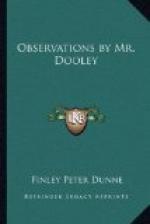“He’s th’ gr-reatest detictive that iver was in a story book. I’ve been r-readin’ about him an’ if I was a criminal, which I wud be if I had to wurruk f’r a livin’, an’ Sherlock Holmes got afther me, I’d go sthraight to th’ station an’ give mesilf up. I’d lay th’ goods on th’ desk an’ say: ‘Sargeant, put me down in th’ hard cage. Sherlock Holmes has jus’ see a man go by in a cab with a Newfoundland dog an’ he knows I took th’ spoons.’ Ye see, he ain’t th’ ordh’nry fly cop like Mulcahy that always runs in th’ Schmidt boy f’r ivry crime rayported fr’m stealin’ a ham to forgin’ a check in th’ full knowledge that some day he’ll get him f’r th’ right thing. No, sir; he’s an injanyous man that can put two an’ two together an’ make eight iv thim. He applies his brain to crime, d’ye mind, an’ divvle th’ crime, no matther how cunnin’ it is, will escape him. We’ll suppose, Hinnissy, that I’m Sherlock Holmes. I’m settin’ here in me little parlor wearin’ a dhressin’ gown an’ now an’ thin pokin’ mesilf full iv morpheen. Here we are. Ye come in. ‘Good-mornin’, Watson.’”
“I ain’t Watson,” said Mr. Hennessy. “I’m Hinnissy.”
“Ah,” said Mr. Dooley; “I thought I’d wring it fr’m ye. Perhaps ye’d like to know how I guessed ye had come in. ’Tis very simple. On’y a matther iv observation. I heerd ye’er step; I seen ye’er refliction in th’ lookin’ glass; ye spoke to me. I put these things together with me thrained faculty f’r observation an’ deduction, d’ye mind. Says I to mesilf: ‘This must be Hinnissy.’ But mind ye, th’ chain iv circumstances is not complete. It might be some wan disguised as ye. So says I to mesilf: ’I will throw this newcome, whoiver he is, off his guard, be callin’ him be a sthrange name!’ Ye wudden’t feel complimented, Hinnissy, if ye knew who Watson is. Watson knows even less than ye do. He don’t know annything, an’ annything he knows is wrong. He has to look up his name in th’ parish raygisther befure he can speak to himsilf. He’s a gr-reat frind iv Sherlock Holmes an’ if Sherlock Holmes iver loses him, he’ll find him in th’ nearest asylum f’r th’ feeble-minded. But I surprised ye’er secret out iv ye. Thrown off ye’er guard be me innocent question, ye popped out ’I’m Hinnissy,’ an’ in a flash I guessed who ye were. Be th’ same process iv raisonin’ be deduction, I can tell ye that ye were home las’ night in bed, that ye’re on ye’er way to wurruk, an’ that ye’er salary is two dollars a day. I know ye were at home las’ night because ye ar-re always at home between iliven an’ sivin, bar Pathrick’s night, an’ ye’er wife hasn’t been in lookin’ f’r ye. I know ye’re on ye’er way to wurruk because I heerd ye’er dinner pail jingle as ye stepped softly in. I know ye get two dollars a day because ye tol’ me ye get three an’ I deducted thirty-three an’ wan third per cint f’r poetic license. ’Tis very simple. Ar-re those shoes ye have on ye’er feet? Be hivins, I thought so.”




